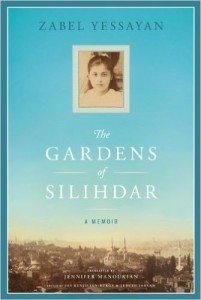BELMONT, Mass.—The National Association for Armenian Studies and Research (NAASR) recently announced the winners of the first Dr. Sona Aronian Book Prizes for Excellence in Armenian Studies. Aronian, who passed away on Nov. 17, 2015, established the prizes last year, to be awarded annually to an outstanding scholarly monograph in the English language in the field of Armenian studies and, in alternating years, to a translation from Armenian into English of a work of literature or of an academic book within the field of Armenian studies.

The award for an academic monograph was awarded to Dr. Bedross Der Matossian for his book, Shattered Dreams of Revolution: From Liberty to Violence in the Late Ottoman Empire, published by Stanford University Press. The prize for translation of a work of literature from Armenian to English was awarded to Jennifer Manoukian for her translation of The Gardens of Silihdar by Zabel Yessayan, published by the Armenian International Women’s Association Press. Both prizes come with a monetary award.
The announcement of the prizes was made by NAASR Academic Director Marc Mamigonian on Fri., Dec. 4, at the Boston-area event in honor of NAASR’s Leadership Circle, of which Dr. Aronian was a member. Her husband, Prof. Geoffrey Gibbs, was present for the announcement.
Though not in attendance, prizewinners Der Matossian and Manoukian provided statements. Der Matossian wrote: “It is a great honor to be the first recipient of the Dr. Sona Aronian Book Prize for Excellence in Armenian Studies given by NAASR. I would like to thank NAASR for recognizing my contribution to the field of modern Armenian history. For 60 years NAASR has been in the forefront of promoting Armenian studies with its multifaceted dimensions. Hence, this is a great privilege. I hope to be able to continue my contribution to the field of Armenian studies by introducing new perspectives and new methodological approaches for understanding modern Armenian history. Thank you.”

Jennifer Manoukian wrote: “There is always a gnawing concern in a translator’s mind—or in a writer’s mind, for that matter—that her work will be just another book spine in, if she’s lucky, the stacks of a university library. And in time, that is what The Gardens of Silihdar will become. But when the gloom of this idea starts to descend, I like to imagine a student in that library stumbling on Yessayan in translation 100 years from now and learning, through her work, not only about late-19th-century Ottoman history, Armenian history, and women’s histories—without allusion to the persecution that tends to overshadow contemporary understandings of what Western Armenian literature is—but also about the complexity of the ideas and human—not intrinsically Armenian—emotions that can be expressed in Western Armenian. I like to imagine—definitely paradoxically and maybe naively—that a translation like this one could galvanize this student, push her to study the language and start her own translations, because, like me, she would feel giddy and restless at the thought of all the wisdom waiting to be uncovered in the neglected works of Western Armenian writers.”
Following the announcement, Mamigonian stated that “NAASR is very pleased and honored to carry forward this legacy of Dr. Sona Aronian’s in years to come, and to provide encouragement to other deserving scholars and translators. We applaud her for endowing these prizes, which are the first of their kind in the U.S. Congratulations to Dr. Bedross Der Matossian and Jennifer Manoukian on their outstanding contributions and well-deserved awards.”
For more information, contact NAASR by calling (617) 489-1610 or e-mailing hq@naasr.org.



Be the first to comment